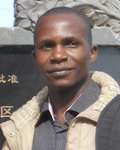| The 50 years of friendship and exchange between China and Tanzania allow for a greater understanding between the people. Here three Tanzanians share with ChinAfrica their life and memories about China.

Joseph Kahama
Chairman & Chief Operating Officer at Tanzanian Royalty Exploration Corp.
One fine day as daylight was surrendering to evening, a group of young boys and girls were playing football, totally ambivalent of the time and unassuming of their surroundings. The world seemed endless and the day full of ample time for play. This particular day was inDodoma,Tanzania, in the 1970s. Strolling down one of the then few paved roads, in the new capital city of Dodoma, and heading toward the children playing football, was a group of both young and much older Chinese men and women, taking what looked like a routine evening walk for a breath of fresh air and a stretch.
The Chinese visitors soon arrived where the children were playing football and spoke in perfect Kiswahili to the children. Joining them in a football game, but not for long as the dark assumed control of the land. The Chinese visitors urged and encouraged the children to go home and wash, but not before handing them "White Rabbit" branded sweets. As it happened, I was among the group of children playing football and a beneficiary of the sweets.
We later learned that the Chinese visitors were a group of the Chinese Medical Team (CMT) who were doctors and dentists, working at the Dodoma Government Hospital. Many decades later, after our inaugural encounter with the Chinese nationals, the CMTs retain a permanent presence inTanzania and I understand, in many parts of Africa. InTanzaniaalone, the CMTs are inDar es Salaam,Dodoma, Tabora and Mara Regions, to name a few. These highly qualified and highly committed Chinese doctors leave their loved ones and families in China, traversing across land and seas, all the way toTanzaniain their goal to assist in diagnosing and treating diseases affecting the many and thereby helping the Tanzanian Government realizing their objective of bringing about better health for all Tanzanians.
The commitment by the CMT is the highest form of corporate social responsibility. It is social responsibility without corporate gain or profit motives. Simply put, medical work being undertaken by the CMT in many parts of Tanzania, both urban and rural, is pure in its objectives and goals. The relationship between the People's Republic ofChina and the United Republic of Tanzania is pure in its sincerity and in its deeds and that is why it has lasted for 50 years, undisturbed. The relationship is historical and at the same time current. Like sweets are to wanton boys and girls, the relationship between the two countries and their people is cherished and enjoyable. Fifty years and growing stronger!

Paulina Kimweri
Content Unit Manager at Star Media
I joined Star Media (Tanzania) Ltd., which is a joint venture company between StarTimes and TBC, as a regular member of staff four years ago. Now I'm at management level as a content unit manager. This is something I will never forget, as my life will never be the same again.
I used to read about diplomatic relations among countries, and I've completed my bachelor's degree in public administration and international relations, where I also studied about diplomatic relations. However this company exposed me to the real world of Chinese culture.
Working with the Chinese is not easy if you do not learn how to get along with them. There are some challenges. I remember I used to work with my boss whose way of communication made me uncomfortable. He was strict with us, and put us under a lot of pressure, which made me uneasy to the point of wanting to look for another job elsewhere. But after learning that it is just the way they talk, I went along with him.
There are some differences between the work styles of Tanzanian and Chinese people. The Chinese want things to be delivered in a short period of time. The work needs to be done and the results to be seen. For the Tanzanians, on the other hand, you do work under less pressure to deliver. So it took me a while to get used to their style of work. Up to now I have learned to do my work according to the style they prefer.
What's surprising and comforting is that Chinese bosses can go around the streets to distribute flyers and observe how the market is changing, which seems different to the Tanzanian culture. Through this experience, I have learnt to go to the field of work and see how advertisement activities are being done, or even participate in offline activities.
I remember when I first joined StarTimes, we only had a small group of staff, working to achieve our company's mission: to enable every Tanzanian household to have access to and be able to watch good digital TV and enjoy digital TV, which sounded more like a dream at that time, but today we have covered a large part of Tanzania. As we localize and globalizeTanzania through our media platform, I am grateful to see our company reaching its goal and growing to another level.

Olivo George Mtung'e
Student at China Agricultural University
Before coming to China, I worked at Tanzania Sisal Board (TSB) in the statistics of sisal production section.China is one of the three leading sisal producers and a leading innovator of sisal products. Many sisal officers were eager to know how Chinese farms are organized inChina.
My journey was made possible through the cooperation between the China Agricultural University and Sokoine University of Agriculture. In the laboratory of Fungicide and Pharmacology, life was good, however there were some difficulties in trying to cope with cultural differences and technical issues. All the members, professors to students, were very welcoming and always supportive when you are in need.
During Spring Festival in 2013 I was invited to join Professor Liu Xili at her home, who is one of the most popular teachers in our lab. The evening started by having snacks and fruits which were decorated in a seating room, while a TV was set ready for the festival program on CCTV.
In addition to my visit to my professor's home, I was invited to visit another family of my classmate in Hunan Province. Here we were able to have a community of Chinese families inviting each other for different meals. A host family would prepare a meal, but the visiting family had to go with something in hand. Here I also experienced a real act of Chinese kindness. During my travels, a man paid for my bus ticket and accompanied me to my host, while refusing all refunds of costs he incurred.
In my opinion,Chinais a good country to live in and Chinese people are kind enough to ensure foreigners' safety. I hope to have a happier life in China during my remaining study life in Beijing. Therefore I hope all Tanzanians would welcome Chinese people in our country for travel and leisure.
(Source: ChinAfrica) | 